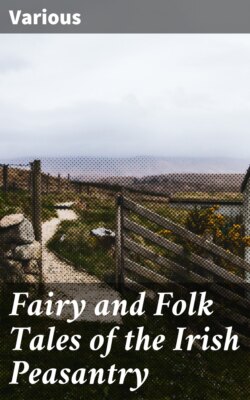Читать книгу Fairy and Folk Tales of the Irish Peasantry - Various - Страница 11
На сайте Литреса книга снята с продажи.
Оглавление"Mysterious are thy laws;
The vision's finer than the view;
Her landscape Nature never drew
So fair as Fancy draws."
Many a time, when a mere child, not more than six or seven years of age, have I gone as far as Frank's weaving-shop, in order, with a heart divided between curiosity and fear, to listen to his conversation with the good people. From morning till night his tongue was going almost as incessantly as his shuttle; and it was well known that at night, whenever he awoke out of his sleep, the first thing he did was to put out his hand, and push them, as it were, off his bed.
"Go out o' this, you thieves, you—go out o' this now, an' let me alone. Nickey, is this any time to be playing the pipes, and me wants to sleep? Go off, now—troth if yez do, you'll see what I'll give yez to-morrow. Sure I'll be makin' new dressin's; and if yez behave decently, maybe I'll lave yez the scrapin' o' the pot. There now. Och! poor things, they're dacent crathurs. Sure they're all gone, barrin' poor Red-cap, that doesn't like to lave me." And then the harmless monomaniac would fall back into what we trust was an innocent slumber.
About this time there was said to have occurred a very remarkable circumstance, which gave poor Frank a vast deal of importance among the neighbours. A man named Frank Thomas, the same in whose house Mickey M'Rorey held the first dance at which I ever saw him, as detailed in a former sketch; this man, I say, had a child sick, but of what complaint I cannot now remember, nor is it of any importance. One of the gables of Thomas's house was built against, or rather into, a Forth or Rath, called Towny, or properly Tonagh Forth. It was said to be haunted by the fairies, and what gave it a character peculiarly wild in my eyes was, that there were on the southern side of it two or three little green mounds, which were said to be the graves of unchristened children, over which it was considered dangerous and unlucky to pass. At all events, the season was mid-summer; and one evening about dusk, during the illness of the child, the noise of a hand-saw was heard upon the Forth. This was considered rather strange, and, after a little time, a few of those who were assembled at Frank Thomas's went to see who it could be that was sawing in such a place, or what they could be sawing at so late an hour, for every one knew that nobody in the whole country about them would dare to cut down the few white-thorns that grew upon the Forth. On going to examine, however, judge of their surprise, when, after surrounding and searching the whole place, they could discover no trace of either saw or sawyer. In fact, with the exception of themselves, there was no one, either natural or supernatural, visible. They then returned to the house, and had scarcely sat down, when it was heard again within ten yards of them. Another examination of the premises took place, but with equal success. Now, however, while standing on the Forth, they heard the sawing in a little hollow, about a hundred and fifty yards below them, which was completely exposed to their view, but they could see nobody. A party of them immediately went down to ascertain, if possible, what this singular noise and invisible labour could mean; but on arriving at the spot, they heard the sawing, to which were now added hammering, and the driving of nails upon the Forth above, whilst those who stood on the Forth continued to hear it in the hollow. On comparing notes, they resolved to send down to Billy Nelson's for Frank Martin, a distance of only about eighty or ninety yards. He was soon on the spot, and without a moment's hesitation solved the enigma.
"'Tis the fairies," said he. "I see them, and busy crathurs they are."
"But what are they sawing, Frank?"
"They are makin' a child's coffin," he replied; "they have the body already made, an' they're now nailin' the lid together."
That night the child died, and the story goes that on the second evening afterwards, the carpenter who was called upon to make the coffin brought a table out from Thomas's house to the Forth, as a temporary bench; and, it is said, that the sawing and hammering necessary for the completion of his task were precisely the same which had been heard the evening but one before—neither more nor less. I remember the death of the child myself, and the making of its coffin, but I think the story of the supernatural carpenter was not heard in the village for some months after its interment.
Frank had every appearance of a hypochondriac about him. At the time I saw him, he might be about thirty-four years of age, but I do not think, from the debility of his frame and infirm health, that he has been alive for several years. He was an object of considerable interest and curiosity, and often have I been present when he was pointed out to strangers as "the man that could see the good people."
